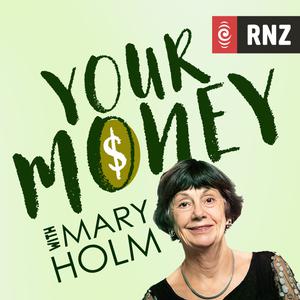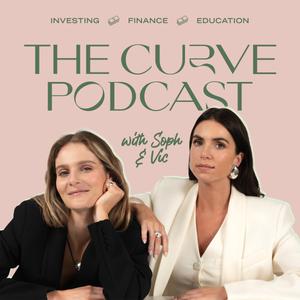
The Happy Saver Podcast - Personal Finance in New Zealand
Ruth
Your friends might not want to talk about money, but I do! Hi, I’m Ruth and I’m a blogger on Personal Finance and in this podcast I tell the stories of Kiwis and their experiences with the money in their lives. How do they use it or how does it use them? Where do they save and invest it and does it work? What are their financial triumphs and financial train wrecks? How can you extract the most out of life and spend as little as possible while doing it? Join me as I ask the questions everyone else is too polite to ask but is dying to know about New Zealanders and their money. Happy Saving! Ruth
- 44 minutes 4 seconds100. A Solo Journey to Financial Independence
MONEY JOURNEYS - EPISODE 100
What's In This Episode?
In mid-October 2024, I brewed a coffee, sat down, and gave Poto a call. She’s been a long-time listener of the podcast, drawing on insights from past guests to help guide her decisions over the years. Back in 2021, she and I started exchanging emails, and we've stayed in touch ever since. When we recently crossed paths in person, I learned more about her journey and couldn’t help asking if she’d join me for a kōrero. True to her kind and generous nature, she agreed. Poto is 57 years old and calls the Central Plateau, in the centre of the North Island, her home and playground. She loves the area and loves the great outdoors. She had been heading down a few avenues that didn’t sit quite right with her and backing out to take another path, but steadily, she tracked towards the FI (Financial Independence) community and a more simple path to wealth. With dedication and mahi, she’s reached a point of financial independence—and today, she’s here to share her story.
THIS WEEKS SPONSOR: This weeks episode is brought to you by PocketSmith.

SUBSCRIBE to The Happy Saver Podcast
wherever you listen to podcasts and never miss an episode.
Apple Podcasts - Spotify - YouTube Music - Castbox17 December 2024, 11:00 pm - 38 minutes 26 seconds99. Work, Life, Balance: With Plenty of Free Time!
MONEY JOURNEYS - EPISODE 99
What's In This Episode?
This week, I’m making a bit of an exception and chatting with someone who was a bit reluctant to talk about money. Which is ironic, given this is a podcast that talks about money. Rob, a 33-year-old plumber from Western Australia, took a little persuading to come on my podcast, but I persisted because I knew enough about him to know that his personal finance story is one that many of us will be able to relate to and draw ideas from. Rob is essentially financially independent, working just a quarter of the year, and he recently hosted Tribe FI, a personal finance retreat. I met Rob after he invited me to speak at the event, and after some detective work to confirm he wasn’t a scammer (spoiler: he’s not), Jonny and I attended—and loved it. In this episode, I delve into Rob’s journey to financial independence and what inspired him to create a space for like-minded people to connect.
THIS WEEKS SPONSOR: This weeks episode is brought to you by PocketSmith.

SUBSCRIBE to The Happy Saver Podcast
wherever you listen to podcasts and never miss an episode.
Apple Podcasts - Spotify - YouTube Music - Castbox26 November 2024, 11:00 pm - 45 minutes 16 seconds98. Life and times of a property investor, turned global traveller.
MONEY JOURNEYS - EPISODE 98
What's In This Episode?
In today's episode, I will be sharing the financial journey of Jack, a Kiwi from the lower North Island. Jack found The Happy Saver when he was searching for podcasts on money. As an investor in rental property, he was looking to learn about shares. As you’ll find out shortly, he leads an interesting life. He has a personality that I can relate to; he said he could talk to a lamp post, and as a result, he meets heaps of people, so he had no qualms about stopping in to visit Jonny and I when he was down in Central Otago riding the famous Rail Trail and doing other interesting things, earlier in the year. We’ve stayed in touch since, and I’m pleased I have because Jack gets about. When we chatted for this podcast, he was sitting in San Fransisco, having just had many months overseas and was getting ready to board a three-week cruise to bring him back home to Aotearoa.
THIS WEEKS SPONSOR: This weeks episode is brought to you by PocketSmith.

SUBSCRIBE to The Happy Saver Podcast
wherever you listen to podcasts and never miss an episode.
Apple Podcasts - Spotify - YouTube Music - Castbox5 November 2024, 11:00 pm - 46 minutes 50 seconds97. Revisit with Chris and Rosemary: These two are not mucking around!
MONEY JOURNEYS - EPISODE 97
What's In This Episode?
Today’s episode is an update on North Island couple Chris and Rosemary. Their first episode came out in March 2021 — it was episode number 49. Since then, we’ve kept in touch, and today’s episode is an update on where this couple are now, in terms of both money and life. It’s safe to say they have absolutely transformed their situation, and I hope this episode lights a fire under those listening and prompts you to reach for a few stretch goals, whatever they might be. Over the last four years, Chris has sent me some pretty epic emails as he went on a deep dive into learning about personal finance. I watched from the sidelines as he got Rosemary on the same page. They’ve since both utterly transformed their financial lives, embarking on a new journey toward financial independence. Today’s update won’t disappoint — these two are not mucking around.
THIS WEEKS SPONSOR: This weeks episode is brought to you by PocketSmith.

SUBSCRIBE to The Happy Saver Podcast
wherever you listen to podcasts and never miss an episode.
Apple Podcasts - Spotify - YouTube Music - Castbox15 October 2024, 11:00 pm - 1 hour 1 minute96. Reality Check
MONEY JOURNEYS - EPISODE 96
What's In This Episode?
Today's episode began with an email from a Kiwi couple in their mid-40s, who asked to be called Tokyo and Rio, inspired by the show Money Heist. Tokyo reached out just before Christmas 2023, sharing how a sinking fund she started nearly a year ago was making her happy amidst a tough financial year. It had been a challenging one—an overseas trip, big bills for their rental property, tax and ACC bills, and a lower-than-expected income. They were considering a $15,000 mortgage top-up to cover it all. But Tokyo wanted to know if there was a better way. Of course, there is another option. I hit reply to her email and proceeded to throw the cat amongst the pigeons.
THIS WEEKS SPONSOR: This weeks episode is brought to you by PocketSmith.

SUBSCRIBE to The Happy Saver Podcast
wherever you listen to podcasts and never miss an episode.
Apple Podcasts - Spotify - YouTube Music - Castbox25 September 2024, 12:00 am - 1 hour 8 minutes95. On the Verge of Lasting Change. Hopefully.
MONEY JOURNEYS - EPISODE 95
What's In This Episode?
When I received an email from a guy called John saying that he and his wife Betty have gone from being terrible with money and trying (unsuccessfully) to grow wealth via debt to completely changing their mentality to one of getting away from debt, even going so far as to head to the mines in Australia to clean up the consumer debt mess they had created, they had my attention. Today, I want to share the story of a 38 and 39-year-old married couple with two primary school-aged kids who are on the crest of a knowledge wave when it comes to money. Month by month, they are reassessing everything they thought to be true about money and now are tackling their biggest remaining debt head-on, their $480,000 mortgage.
THIS WEEKS SPONSOR: This weeks episode is brought to you by PocketSmith.

SUBSCRIBE to The Happy Saver Podcast
wherever you listen to podcasts and never miss an episode.
Apple Podcasts - Spotify - YouTube Music - Castbox4 September 2024, 12:00 am - 49 minutes 40 seconds94. Continuous Improvement
MONEY JOURNEYS - EPISODE 94
What's In This Episode?
Ruby stumbled across The Happy Saver in October of 2022, prompting her to email me with a couple of questions. She’d recently signed up with Sharesies and was testing the waters by investing $20 a week, and had a few questions about where to start. Plus, she had a question about her KiwiSaver. While at home with two young tamariki, she had just realised that even when she was not in the paid workforce, she could voluntarily contribute money into her account, which she immediately started doing. Taking a moment to think about investing made her start digging around for more information about her money. From then on, her thirst for financial literacy grew, and she began to search for information that could teach her to be better with her pūtea. A year went by, and I heard from her again. She went into more detail, which led to me asking her to be on my podcast today. She is now 34, and her husband Tim is 38. They live in rural Canterbury with their two preschool children. I think their journey is typical of a lot of Kiwis, and what I particularly like is that they continue to adjust their financial course as new information comes to light.
THIS WEEKS SPONSOR: This weeks episode is brought to you by PocketSmith.

SUBSCRIBE to The Happy Saver Podcast
wherever you listen to podcasts and never miss an episode.
Apple Podcasts - Spotify - YouTube Music - Castbox14 August 2024, 12:00 am - 34 minutes 18 secondsPart 6: INVESTING
FI Series - Part 6: INVESTING
What's In This Episode?
Congratulations, you have made it to the final episode of this series of six: INVESTING. Investing can be incredibly complex, but I found a way to simplify it. I used to feel overwhelmed by the options available, but now I don't. I’m hoping to help you feel the same way. But still, this is one of the most challenging podcasts I have EVER written. Condensing “investing” into a single episode is no easy feat. The Happy Saver was born out of my search for information about what I could invest our money in. It took me years to arrive at our current strategy, which combines KiwiSaver and ETF investments. I don’t want you to take so long to settle on your own strategy. I’m no different to you when I say, “I wish I knew then what I know now”. We had some margin in our budget, and I was looking for something to make us money. I started by asking my bank's opinion and followed a trail of crumbs of information from there. Ultimately, I finally found good information, which I want to share today.
THIS WEEKS SPONSOR: This weeks episode is brought to you by PocketSmith.

SUBSCRIBE to The Happy Saver Podcast
wherever you listen to podcasts and never miss an episode.
Apple Podcasts - Spotify - YouTube Music - Castbox24 July 2024, 12:00 am - 25 minutes 6 secondsPart 5: DEBT FREE
FI Series - Part 5: DEBT FREE
What's In This Episode?
Get out of debt, and stay out of debt. I think of debt as a phase of life that I moved through. That period has passed, and I’ve moved on. Jonny and I have been entirely debt-free since our early 30s, and I encourage you to head down the debt-free path as well. Debt has always had an ‘ick’ factor for me, a feeling I am grateful for. I like earning interest, but I hate paying it. Despite our bank trying to lure us back into debt to buy a rental property, there has never been a day that we regretted becoming permanently debt-free. We never have to seek the bank's opinion about our financial decisions again.
THIS WEEKS SPONSOR: This weeks episode is brought to you by PocketSmith.

SUBSCRIBE to The Happy Saver Podcast
wherever you listen to podcasts and never miss an episode.
Apple Podcasts - Spotify - YouTube Music - Castbox10 July 2024, 12:00 am - 22 minutes 3 secondsPart 4: KIWISAVER
FI Series - Part 4: KIWISAVER
What's In This Episode?
The fourth part of this six-part series is one of the easier topics to cover, KiwiSaver. Joining KiwiSaver is a no-brainer, and it still surprises me when I meet people who are not in it. I’m always looking ahead and doing my best to determine what I might need money for and how much I might need. I keep my ear to the ground about how affordable retirement is for New Zealanders. I talk to people over 65 and ask them what advice they would give me about financially preparing for retirement. Then I ask myself if, on my current trajectory, I’m heading in the right direction.
THIS WEEKS SPONSOR: This weeks episode is brought to you by PocketSmith.

SUBSCRIBE to The Happy Saver Podcast
wherever you listen to podcasts and never miss an episode.
Apple Podcasts - Spotify - YouTube Music - Castbox26 June 2024, 12:00 am - 19 minutes 10 secondsPart 3: EMERGENCY FUND
FI Series - Part 3: EMERGENCY FUND
What's In This Episode?
The best thing I ever did was set some cash into a bank account, which we could instantly access in a financial emergency. It is an amount of money set aside in a specific bank account to be used for bailing myself out if something happens that I didn’t otherwise plan for, but I need money to pay for. It takes me less than one minute to log into my banking and move money from my emergency account to my spending account. My previous episode discussed budgeting and planning for upcoming expenses. However, try as I might, I can’t think of everything. Your emergency fund covers the things you forgot despite your best intentions.
THIS WEEKS SPONSOR: This weeks episode is brought to you by PocketSmith.

SUBSCRIBE to The Happy Saver Podcast
wherever you listen to podcasts and never miss an episode.
Apple Podcasts - Spotify - YouTube Music - Castbox12 June 2024, 12:00 am - More Episodes? Get the App
Your feedback is valuable to us. Should you encounter any bugs, glitches, lack of functionality or other problems, please email us on [email protected] or join Moon.FM Telegram Group where you can talk directly to the dev team who are happy to answer any queries.
 Cooking the Books with Frances Cook
Cooking the Books with Frances Cook
 Your Money With Mary Holm
Your Money With Mary Holm
 The Property Academy Podcast
The Property Academy Podcast
 The Curve
The Curve